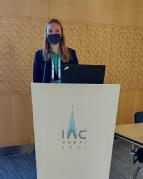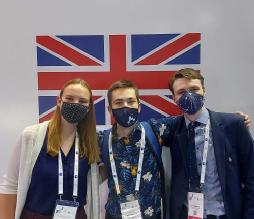Katie Savva: IAC blog

NASA Astronaut Christina Koch speaking at a panel on the main stage of the IAC
On the 24th of October 2021, I travelled to the 72nd International Astronautical Congress (IAC) to attend and present my paper in one of the technical sessions. The IAC is the world’s largest global space conference with over 3,500 exhibitors, country delegations, academics, and industry professionals in all fields from technical disciplines to the business side of space, space law, and education. This meant that there was no shortage of learning opportunities for the 500 students in attendance, particularly as everyone was so passionate and willing to explain their research in an accessible format.
It was also exciting to attend panels and presentations about life sciences within the space sector, as usually at general space-related conferences physics and engineering topics dominate these sessions.
Whilst my trip began on the 24th, my journey to the IAC started long before. Over the past year I have been working on a project as part of the European Space Agency’s (ESA) Spin Your Thesis! scheme. The Your Thesis! scheme is a collection of programmes run by ESA Education to allow students to conduct original research in altered gravity conditions. It is the students from these Your Thesis! programmes that collectively wrote and submitted a paper to the IAC. Having not authored a full paper before, let alone been the lead author, this process was certainly a learning curve.
The biggest lesson I learnt was that being the lead author requires more logistical and leadership skills than I had anticipated, what with finding sponsorships, completing endless paperwork, and keeping the team to deadlines so that we actually made it to the conference. I also learnt the value of networking and being able to pitch your presentation in 60 seconds to convince others to attend - no one wants to present to an empty room!
All in all it was an incredible opportunity that I am grateful to have experienced. If you’re interested in life sciences within the space sector or want to find out how to get involved, please feel free to drop me a message at .


